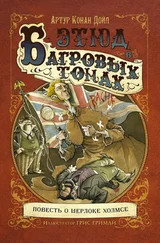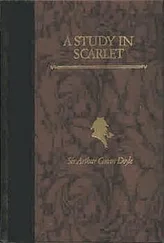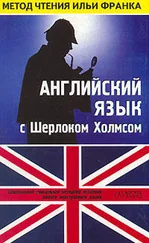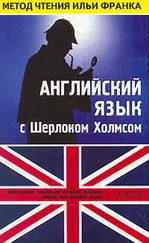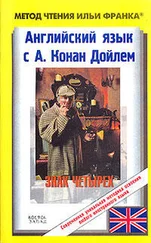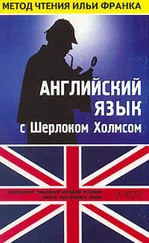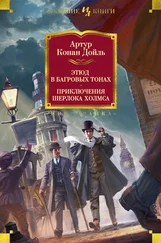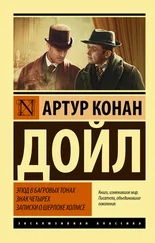triumphant [traI'Vmf@nt], savage ['s&vIdZ], statue ['st&tju:], roar [rO:], fierce [fI@s]
The whole thing occurred in a moment — so quickly that I had no time to realize it. I have a vivid recollection of that instant, of Holmes' triumphant expression and the ring of his voice, of the cabman's dazed, savage face, as he glared at the glittering handcuffs, which had appeared as if by magic upon his wrists. For a second or two we might have been a group of statues. Then, with an inarticulate roar of fury, the prisoner wrenched himself free from Holmes's grasp, and hurled himself through the window. Woodwork and glass gave way before him; but before he got quite through, Gregson, Lestrade, and Holmes sprang upon him like so many staghounds. He was dragged back into the room, and then commenced a terrific conflict. So powerful and so fierce was he, that the four of us were shaken off again and again. He appeared to have the convulsive strength of a man in an epileptic fit. His face and hands were terribly mangled by his passage through the glass, but loss of blood had no effect in diminishing his resistance. It was not until Lestrade succeeded in getting his hand inside his neckcloth and half-strangling him that we made him realize that his struggles were of no avail; and even then we felt no security until we
had pinioned his feet as well as his hands. That done, we rose to our feet breathless and panting.
"We have his cab (у нас его кеб) ," said Sherlock Holmes. "It will serve to take him to Scotland Yard (воспользуемся им: «он послужит», чтобы доставить его в Скотленд-Ярд) . And now, gentlemen," he continued, with a pleasant smile (а теперь, джентльмены, — продолжил он с приятной улыбкой) , "we have reached the end of our little mystery (мы добрались до конца нашей маленькой тайны) . You are very welcome to put any questions that you like to me now (пожалуйста, задавайте теперь любые вопросы, что придут к вам в голову: «вы очень приветствуетесь задавать мне сейчас любые вопросы, что вы захотите») , and there is no danger that I will refuse to answer them (и не опасайтесь: «и нет опасности», что я откажусь отвечать на них) ."
pleasant [pleznt], danger ['deIndZ@], answer ['A:ns@]
"We have his cab," said Sherlock Holmes. "It will serve to take him to Scotland Yard. And now, gentlemen," he continued, with a pleasant smile, "we have reached the end of our little mystery. You are very welcome to put any questions that you like to me now, and there is no danger that I will refuse to answer them."
PART II. The Country of the Saints
(часть II. Страна святых)
Chapter I. On The Great Alkali Plain
(На огромной соляной равнине; alkali — щелочь; растворимая минеральная соль)
IN the central portion of the great North American Continent there lies an arid and repulsive desert (в центральной части огромного североамериканского континента лежит безводная отвратительная пустыня; arid — сухой, засушливый; безводный; repulsive — омерзительный, противный) , which for many a long year served as a barrier against the advance of civilisation (которая на протяжении долгих лет служила барьером для продвижения цивилизации) . From the Sierra Nevada to Nebraska (от Сьерра-Невады до Небраски) , and from the Yellowstone River in the north to the Colorado upon the south (и от реки Йеллоустоун на севере до реки Колорадо на юге) , is a region of desolation and silence (лежит район запустения и тишины) . Nor is Nature always in one mood throughout this grim district (но и в этом мрачном уголке природа не всегда представлена в одном настроении; mood — настроение; расположение духа; throughout — повсюду; на всем протяжении; district — район; местность) . It comprises snow-capped and lofty mountains (там можно найти и покрытые снегом величественные горы; to comprise — включать; заключать в себе, содержать; to cap — надевать шапку, покрывать голову; покрывать; накрывать; cap — кепка, шапка; lofty — очень высокий; величественный) , and dark and gloomy valleys (и темные, мрачные ущелья; valley —долина; gloom — мрак; темнота; мрачность, уныние) . There are swift-flowing rivers which dash through jagged cañons (там быстрые реки, которые несутся по скалистым каньонам; to flow — течь; jagged — зубчатый, зазубренный; cañon = canyon — каньон) ; and there are enormous plains (и огромные равнины) , which in winter are white with snow (которые зимой белы от снега) , and in summer are grey with the saline alkali dust (а летом серы от соляной щелочной пыли) . They all preserve, however, the common characteristics of barrenness, inhospitality, and misery (но тем не менее везде сохраняется общий дух бесплодности, неприветливости и запустения; characteristic —характерная черта; характерная особенность, признак; barren — неплодородный, бесплодный; hospitality — гостеприимность; misery — страдание; несчастье; бедность, нужда) .
alkali ['&lk(@)laI], throughout [Tru'aut], mountain ['mauntIn], saline ['seIlaIn]
In the central portion of the great North American Continent there lies an arid and repulsive desert, which for many a long year served as a barrier against the advance of civilisation. From the Sierra Nevada to Nebraska, and from the Yellowstone River in the north to the Colorado upon the south, is a region of desolation and silence. Nor is Nature always in one mood throughout this grim district. It comprises snow-capped and lofty mountains, and dark and gloomy valleys. There are swift-flowing rivers which dash through jagged cañons; and there are enormous plains, which in winter are white with snow, and in summer are grey with the saline alkali dust. They all preserve, however, the common characteristics of barrenness, inhospitality, and misery.
There are no inhabitants of this land of despair (в этой стране отчаяния нет жителей) . A band of Pawnees or of Blackfeet may occasionally traverse it in order to reach other hunting-grounds (группа индейцев-пауни или блэкфит может иногда пересечь ее, чтобы перебраться на новые охотничьи угодья) , but the hardiest of the braves are glad to lose sight of those awesome plains (но даже самые закаленные из краснолицых рады выбраться из этих ужасных равнин; hardy — мужественный, отважный; закаленный; brave — индейский воин; to lose sight of — потерять из виду; awesome — внушающий страх, ужасающий) , and to find themselves once more upon their prairies (и снова оказаться посреди родных прерий: «на своих прериях») . The coyote skulks among the scrub (койоты скрываются в кустарниках; to skulk — красться; прятаться) , the buzzard flaps heavily through the air (стервятники натужно машут крыльями в воздухе; to flap — ударять, хлопать крыльями) , and the clumsy grizzly bear lumbers through the dark ravines (и неуклюжий медведь-гризли ковыляет по мрачным ущельям; to lumber — тяжело ступать, неуклюже двигаться) , and picks up such sustenance as it can amongst the rocks (выискивая, какую сможет найти, пищу среди скал; to pick up — поднимать, подбирать; sustenance — питание; пища) . These are the sole dwellers in the wilderness (это единственные обитатели этой пустыни; to dwell — жить, обитать, находиться, пребывать) .
Читать дальше

